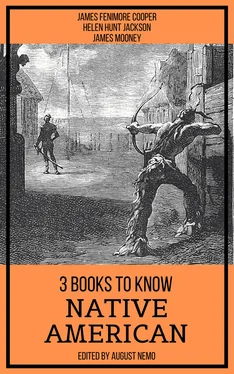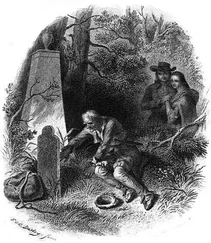The low, muttering sounds of his threatening voice were still audible, when the wounded foal, first rearing on its hinder legs, plunged forward to its knees. It was met by Chingachgook, whose knife passed across its throat quicker than thought, and then precipitating the motions of the struggling victim, he dashed it into the river, down whose stream it glided away, gasping audibly for breath with its ebbing life. This deed of apparent cruelty, but of real necessity, fell upon the spirits of the travellers like a terrific warning of the peril in which they stood, heightened as it was by the calm though steady resolution of the actors in the scene. The sisters shuddered and clung closer to each other, while Heyward instinctively laid his hand on one of the pistols he had just drawn from their holsters, as he placed himself between his charge and those dense shadows that seemed to draw an impenetrable veil before the bosom of the forest.
The Indians, however, hesitated not a moment, but taking the bridles, they led the frightened and reluctant horses into the bed of the river.
At a short distance from the shore they turned, and were soon concealed by the projection of the bank, under the brow of which they moved, in a direction opposite to the course of the waters. In the meantime, the scout drew a canoe of bark from its place of concealment beneath some low bushes, whose branches were waving with the eddies of the current, into which he silently motioned for the females to enter. They complied without hesitation, though many a fearful and anxious glance was thrown behind them towards the thickening gloom which now lay like a dark barrier along the margin of the stream.
So soon as Cora and Alice were seated, the scout, without regarding the element, directed Heyward to support one side of the frail vessel, and posting himself at the other, they bore it up against the stream, followed by the dejected owner of the dead foal. In this manner they proceeded, for many rods, in a silence that was only interrupted by the rippling of the water, as its eddies played around them, or the low dash made by their own cautious footsteps. Heyward yielded the guidance of the canoe implicitly to the scout, who approached or receded from the shore, to avoid the fragments of rocks, or deeper parts of the river, with a readiness that showed his knowledge of the route they held. Occasionally he would stop; and in the midst of a breathing stillness, that the dull but increasing roar of the waterfall only served to render more impressive, he would listen with painful intenseness, to catch any sounds that might arise from the slumbering forest. When assured that all was still, and unable to detect, even by the aid of his practised senses, any sign of his approaching foes, he would deliberately resume his slow and unguarded progress. At length they reached a point in the river, where the roving eye of Heyward became riveted on a cluster of black objects, collected at a spot where the high bank threw a deeper shadow than usual on the dark waters. Hesitating to advance, he pointed out the place to the attention of his companion.
“Ay,” returned the composed scout, “the Indians have hid the beasts with the judgment of natives! Water leaves no trail, and an owl’s eyes would be blinded by the darkness of such a hole.”
The whole party was soon reunited, and another consultation was held between the scout and his new comrades, during which, they whose fates depended on the faith and ingenuity of these unknown foresters, had a little leisure to observe their situation more minutely.
The river was confined between high and cragged rocks, one of which impended above the spot where the canoe rested. As these, again, were surmounted by tall trees, which appeared to totter on the brows of the precipice, it gave the stream the appearance of running through a deep and narrow dell. All beneath the fantastic limbs and ragged tree-tops, which were, here and there, dimly painted against the starry zenith, lay alike in shadowed obscurity. Behind them, the curvature of the banks soon bounded the view, by the same dark and wooded outline; but in front, and apparently at no great distance, the water seemed piled against the heavens, whence it tumbled into caverns, out of which issued those sullen sounds that had loaded the evening atmosphere. It seemed, in truth, to be a spot devoted to seclusion, and the sisters imbibed a soothing impression of security, as they gazed upon its romantic, though not unappalling beauties. A general movement among their conductors, however, soon recalled them from a contemplation of the wild charms that night had assisted to lend the place, to a painful sense of their real peril.
The horses had been secured to some scattered shrubs that grew in the fissures of the rocks, where, standing in the water, they were left to pass the night. The scout directed Heyward and his disconsolate fellow-travellers to seat themselves in the forward end of the canoe, and took possession of the other himself, as erect and steady as if he floated in a vessel of much firmer materials. The Indians warily retraced their steps towards the place they had left, when the scout, placing his pole against a rock, by a powerful shove, sent his frail bark directly into the centre of the turbulent stream. For many minutes the struggle between the light bubble in which they floated, and the swift current, was severe and doubtful. Forbidden to stir even a hand, and almost afraid to breathe, lest they should expose the frail fabric to the fury of the stream, the passengers watched the glancing waters in feverish suspense. Twenty times they thought the whirling eddies were sweeping them to destruction, when the master-hand of their pilot would bring the bows of the canoe to stem the rapid. A long, a vigorous, and, as it appeared to the females, a desperate effort, closed the struggle. Just as Alice veiled her eyes in horror, under the impression that they were about to be swept within the vortex at the foot of the cataract, the canoe floated, stationary, at the side of a flat rock, that lay on a level with the water.
“Where are we? and what is next to be done?” demanded Heyward, perceiving that the exertions of the scout had ceased.
“You are at the foot of Glenn’s,” returned the other, speaking aloud, without fear of consequences, within the roar of the cataract; “and the next thing is to make a steady landing, lest the canoe upset, and you should go down again the hard road we have travelled, faster than you came up; ’tis a hard rift to stem, when the river is a little swelled; and five is an unnatural number to keep dry, in the hurry-skurry, with a little birchen bark and gum. There, go you all on the rock, and I will bring up the Mohicans with the venison. A man had better sleep without his scalp, than famish in the midst of plenty.”
His passengers gladly complied with these directions. As the last foot touched the rock, the canoe whirled from its station, when the tall form of the scout was seen, for an instant, gliding above the waters, before it disappeared in the impenetrable darkness that rested on the bed of the river. Left by their guide, the travellers remained a few minutes in helpless ignorance, afraid even to move along the broken rocks, lest a false step should precipitate them down some one of the many deep and roaring caverns, into which the water seemed to tumble, on every side of them. Their suspense, however, was soon relieved; for aided by the skill of the natives, the canoe shot back into the eddy, and floated again at the side of the low rock before they thought the scout had even time to rejoin his companions.
“We are now fortified, garrisoned, and provisioned,” cried Heyward, cheerfully, “and may set Montcalm and his allies at defiance. How, now, my vigilant sentinel, can you see anything of those you call the Iroquois, on the mainland?”
Читать дальше












